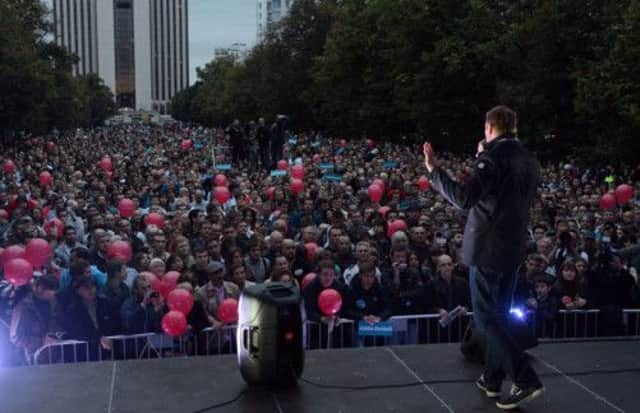Navalny takes to streets in Moscow mayoral race


Navalny has little hope of defeating incumbent Sergei Sobyanin, but polls show his star is rising. And if he gets a big chunk of the vote, the Kremlin will face pressure to show leniency over his five-year jail term for embezzlement, and the grassroots protest movement that fizzled out last year may gain fresh impetus.
Mr Sobyanin, meanwhile, is playing the regal incumbent. Throughout the campaign, the Kremlin-backed politician has been all but invisible, allowing the drone of drills and smell of fresh paint – signs of a Moscow makeover – to remind voters of who is in charge.
Advertisement
Hide AdAdvertisement
Hide AdHowever, Navalny is the one who has been soaking up attention. Late last week, he stood on a stage in a Moscow park, and attempted to connect with an audience he rarely reaches through Twitter: the feared and revered babushka contingency.
“We know that [in Soviet times] our oil money was spent on enormous factories, industry, railroads, roads, science, health care, rockets,” he said, riffing on a nostalgia felt by many older Russians, who saw hopes dashed and savings depleted under post-Soviet political reforms.
“But can you name a single major business that’s been built in this country in the past ten years? I can’t!” The old ladies sitting in the front row chuckled and shook their heads.
On Sunday, police briefly detained Navalny after he left the stage of a campaign event, and released him a short time later. The detention was part of the regular harassment he faces.
Polling data on the race is limited, but the trends are clear. The number of Muscovites ready to vote for Navalny on 8 September has breached 10 per cent and may be moving towards 20 per cent. Meanwhile, Mr Sobyanin’s ratings, while still above the 50 per cent that would allow him to avoid a run-off, are slipping by the week. There are four other party-backed candidates in the race, none projected to snag more than 5 per cent.
Last month, Navalny was sentenced to five years in prison on embezzlement charges, but was released the day after his conviction in what many have described as an effort to legitimise the mayoral race and ensure that Mr Sobyanin – who was appointed as mayor and is seen as a possible successor to Mr Putin – is regarded as an elected politician with widespread support. Such legitimacy is considered important because Mr Putin’s forces are at their weakest in Moscow. When Mr Putin won back the presidency last year, he won only 47 per cent of the capital’s vote, against 64 per cent nationwide.
Masha Lipman at the Carnegie Endowment in Moscow said that Navalny had already achieved something by casting doubt over the inevitability of Mr Putin’s power.
“One of his greatest achievements is … adding an element of risk and uncertainty,” she said. “Putin built a political system in this country that is risk averse, it’s a political monopoly.”
Advertisement
Hide AdAdvertisement
Hide AdIn a survey by the independent Levada polling centre, 48 per cent of people said they would vote for a mayor with experience; 47 per cent said personal qualities, such as “openness and determination”, were crucial.
Navalny, 37, a sharp-tongued lawyer, has plenty of the latter. He has waged an intensive campaign with the equivalent of almost £1 million in funds raised online, meeting with hundreds of voters every day and mobilising enthusiastic young volunteers to help hand out leaflets in the street and on the metro.
Leonid Volkov, Navalny’s campaign manager, said: “The fight is for the 30 per cent of voters who haven’t decided yet.”